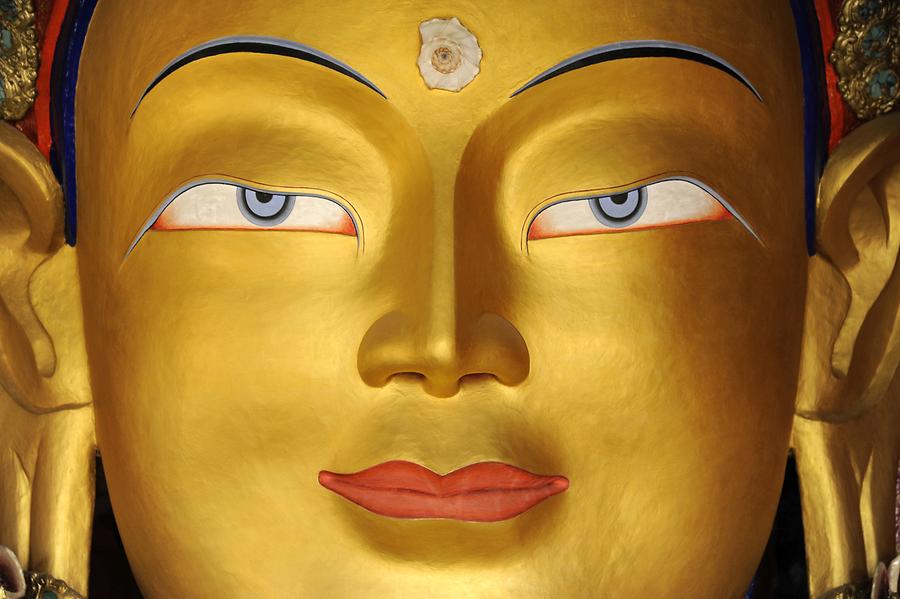Buddha#

Buddha, August 2011, © Gerhard Huber, under CC BY-NC 4.0 +Edu
In his “Four Noble Truths” the historic Buddha created a world view that seems more like a psychotherapeutic concept than a religion: as a starting point serves the realization that all life is bound to suffering. Even happiness and pleasure contain suffering for they are limited and turn to sadness as soon as people have to go without them. The cause of this suffering lays in the human desire for transient things like possession, power and lust. And it is also rooted in the unsparing realization that all human ambition inevitably end with death. The “Third Noble Truth” brings a positive message though: when one can overcome desire, the suffering ends. Without desire there cannot be disappointment. How to achieve such an outlook on life, Buddha teaches in his “Noble Eightfold Path”: the path is a middle course avoiding any extremes. Buddha rejects uncontrolled sensual joy as well as unlimited asceticism. The Eightfold Path is a system marked by self-discipline based on just action without harming anyone, moral behavior and a striving for knowledge and mediation to overcome men’s illusion of his “self”. Only when one is able to dissolve the Self through this method of thinking and one accept the essential unity of all being, one can leave the cycle of death and rebirth. Beyond all this Nirvana awaits a state of constant bliss. This way oneself can become Buddha the “Enlightened”. To achieve this goal one needs several rebirths though and has to collect piece by piece much positive karma by leading a morally implacable life. Karma means the sum of all good and bad deeds in a life. The better the balance sheet looks the higher the rebirth. If the balance is in the negative though, one has to fear rebirth as an animal or plant.
The cycle of Rebirths has nothing to do with metempsychosis, since Buddhism denies the existence of an immortal soul. The only thing that is reborn is the balance of good and evil deeds of the past existence. The new life does not start with an old soul but with a balance to be improved. The future of a person solely depends of what one does in his present life. One does not have to answer to any deity for their actions but is the only master of their destiny. This entails: strict discipline toward oneself and a lot of tolerance toward others.
In seinen Vier Edlen Wahrheiten entwirft der historische Buddha eine Weltsicht, die eher einer psychotherapeutischen Lehre als einer Religion entspricht: Am Anfang steht die Erkenntnis, dass das menschliche Leben dem Leiden unterworfen ist. Selbst Glück und Vergnügen beinhalten das Leiden, weil sie zeitlich begrenzt sind und in Traurigkeit umschlagen, sobald der Mensch auf sie verzichten muss. Die Ursache dieses Leidens liegt in der Begierde nach vergänglichen Werten wie Besitz, Macht und Lust sowie in der schonungslosen Erkenntnis, dass jeder menschliche Ehrgeiz unabwendbar mit dem Tode endet. Die Dritte Edle Wahrheit bringt schließlich eine positive Nachricht: Wenn man die Begierden überwindet, wird das Leid aufhören. Wer nicht begehrt, wird auch nicht enttäuscht. Wie man diese Lebenseinstellung erreicht, dazu weist Buddha im Edlen Achtfachen Pfad den Weg: Dieser Pfad ist ein Weg der Mitte, der alle Extreme vermeidet. Buddha lehnt hemmungslose Sinnesfreuden genauso ab wie ungezügelte Askese. Der Achtfache Pfad ist ein von Selbstdisziplin geprägtes System aus rechtem Handeln, das niemanden verletzt, sittlichem Verhalten und dem Streben nach Wissen und Meditation, um das illusorische „Ich“ des Menschen zu überwinden. Erst wenn man in diesen Geistesübungen das eigene Ich auflöst und die grundsätzliche Einheit allen Seins erkennt, verlässt man den Kreislauf aus Tod und Wiedergeburt. Dahinter wartet das Nirwana, einen Zustand ewiger Seligkeit. Damit wird man selbst zum Buddha, zum „Erleuchteten“. Zur Erlangung dieses großen Zieles benötigt man jedoch unzählige Wiedergeburten, bei denen man Stück für Stück durch ein moralisch einwandfreies Leben möglichst viel positives Karma sammelt. Karma meint die Summe aller positiven und negativen Taten eines Lebens. Je besser diese Bilanz ausfällt, umso höher wird die Wiedergeburt sein. Weist die Bilanz jedoch ein Minus auf, muss man eine Wiedergeburt als Tier oder Pflanze befürchten.
Da der Buddhismus eine unsterbliche Seele verneint, hat der Zyklus der Wiedergeburten auch nichts mit Seelenwanderung zu tun. Wiedergeboren wird nur der Saldo aus guten und schlechten Taten der erloschenen Existenz. Das neue Leben beginnt nicht mit einer alten Seele, sondern mit einem neuen Kontostand, den es zu verbessern gilt. Die Zukunft eines Menschen hängt vollkommen von dem ab, was er in der Gegenwart aus seinem Leben macht. Er muss sich vor keinem Gott für seine Taten verantworten, er selbst ist ausschließlicher Herr über sein Schicksal. Dies bedeutet: strenge Disziplin sich selbst gegenüber und große Toleranz anderen gegenüber.